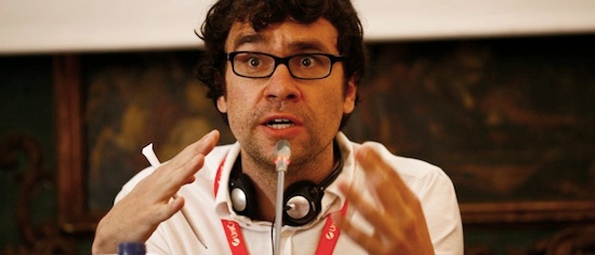by Leigh Cuen

Emily Bell is director of the Tow Center for Digital Journalism at Colombia Journalism School in New York City. She co-authored “Post-industrial journalism: adapting to the present,” an influential report on journalism in the digital age. Her previous experience includes 20 years of experience at newspapers such as The Guardian and The Observer.
How can journalists gain training and mentorship if they can’t afford J-school?
Join groups like Hacks/Hackers and the Online News Association. If you don’t find a group that serves your needs, create one or open a local chapter of an international network. These groups are not an alternative to training and journalism school, but they are somewhere to start. Reach out to local journalists and build a support network for yourself. Journalists today have to do more than ever before. But you also have more tools than ever before.
How can aspiring journalists “break into” the industry?
1. Become an expert in something. Dig down deep and really understand.
2. Start self-publishing. You need to have an online presence.
3. Seek out people like yourself, join groups that are doing work you admire. Contact journalists whose work you respect and ask them for guidance.

Bertrand Pecquerie is the CEO of the Global Editors Network. His previous titles include Director of the World Editors Forum and CEO of the World Media Network. From 1996 to 2002 he headed World Media Live, dealing with media in seven different languages.
Best Free Resources For Journalists:
1. Poynter.org
2. HuffPost Live by Roy Sekoff
3. Global Editors Network’s newsletter
How can aspiring journalists “break into” the industry?
The youth today will have a lot of difficulty entering traditional news organizations. These organizations are not hiring; they are firing. There are two solutions.
One is to go to what I call “pure players,” news organizations that publish strictly online. A few great European examples are Rue 89 and France TV Interactive. They aren’t big, just 40 or so journalists each, but they are expanding.
The second solution is entrepreneurial journalism. This is not a solution for a young journalist starting from scratch. But after 10 years, if you become a specialist you can make your own platform. The main problem for the media of the future is trust. You need to prove you can be trusted. And then you can make your own business.
What steps can young journalists take to advance their careers?
1. Build your reputation online.
Immediately go to Twitter and Reddit, then create your own network of colleagues. And don’t’ talk too much about your personal life on Twitter.
Great journalists must be good on social media, build your reputation online. I don’t think Facebook is the right platform for this. It’s too personal. The broad social media will diminish in the near future. And specialized, niche networks will become more important.
2. Don’t lose hope.
Be optimistic about the future of news. You will have more people in news. You will need specialized live bloggers, and many more new job positions. More diverse skills are needed in the newsroom.
The most important thing is storytelling. No matter what the platform, being a journalist is about being a storyteller. There are many ways to tell a story.
3. Define your audience.
Instead of writing for a national audience, think hyper-local and international. National media is oversaturated. The real talents will be journalists that can manage hyper-local news very smartly. Readers want to reconnect with their immediate surroundings. Hyper-local journalists have a brilliant future.

Mario Tedeschini Lalli is director of innovation and development at the Italian media company Gruppo Editoriale L’Espresso. He has worked for multiple news organizations, including CNNitalia.it and Repubblica.it. He was the first international board member of the Online News Association, and is also currently a visiting lecturer in Digital Journalism at the Urbino Journalism School.
Best Free Resources For Journalists:
1. Evernote
2. Soundcloud
3. Google Maps
4. WordPress (or any mobile blogging platform)
5. Online News Association
How can aspiring journalists “break into” the industry?
The problem with the journalism industry today is the word ‘industry.’ I’m not sure there is an industry anymore, at least in the majority of the western world. I think that young journalists today are in the same position as actors and dancers. We expect that entertainers have day jobs in order to support themselves. They work as waiters, etc. Now we need to have an understanding that is the current situation for young journalists, at least in Italy. You probably have to support yourself doing other things.
And be a journalist right away, don’t wait for an organization to hire you. Find your niche and report on it by yourself. It is relatively easier to get a job at a traditional organization if you can show you are already producing good journalism. Also, keep gaining new skills. If a journalist has talents with multimedia they can offer a more diverse product.
At the end of the day, young journalists need the same things that old journalists need: curiosity and a genuine interest in people. The main thing that has changed is the way that you publish the information you find. Today there are so many ways. In that respect, this young generation of journalists is in a better situation than the old guard.

Justin Peter is managing editor of the Columbia Journalism Review online. He has written for numerous US publications including Slate, The Washington Monthly and The New York Times.
Best Free Resources for Journalists:
1. Poynter.org
2. Colombia Journalism Review
3. New York Times website
What steps can journalists take to advance their careers?
1. Listen to the people you are interviewing, to everyone around you. A quality of the best journalists out there is always that they are genuinely interested in the people they talk to.
2. Be informed. You can’t be a good journalist without understanding historical context. It helps you ask better questions. It helps you give better analysis.
3. Understand social media. Know what social media is good for and what it isn’t. Social media helps you get in touch with people you wouldn’t otherwise have access to. But don’t falsely equate something that is important on social media to something that is important in the world in general. Not everyone you need to talk to is on social media.
4. Get up and go. There is no substitute for being there.
5. Always bring two pens. Sometimes, when you need it most, your iphone will run out of battery, your tape recorder malfunction, your pen run out of ink. That second pen will come to rescue.
How can aspiring journalists “break into” the industry?
Don’t be afraid to be obnoxious. Sometimes, the only way you will get someone’s attention is just by demanding that they give it to you. Speaking from personal experience, I will take someone more seriously if they are persistent.
What is the future of journalism?
Journalism is opening up. Before, only a few people could become journalists. Today that is radically changing. The essence of journalism is curiosity about how the world works, and the urge to investigate and then actually tell people about it. In that sense if can be a hobby or a lifestyle, as well as a profession. I think it’s a great thing. It’s the most interesting thing in the world, to feel like you are in the middle of a story. There will always be opportunities for people that are curious and ambitious. The world needs more people that want to find out why things are the way they are, that ask the hard questions, and don’t just blindly except it.

Aron Pilhofer is the editor of interactive news at The New York Times, the co-founder of Hacks/Hackers and co-founder of Documentcloud.org, a non-profit startup designed to improve journalism by making source documents easier find, search, analyze and share online.
Best Free Resources for Journalists:
1. Data Journalism Handbook
2. European Journalism Center
3. Investigative Reporters and Editors
What steps can journalists take to advance their careers?
Think about your other passions, how they connect to journalism. I never thought my interest in data and code was even remotely related to journalism. And now data journalism is my profession. Look beyond media, and consider the other fields you are interested in. Then look for unconventional connections between your passions.
How can aspiring journalists “break into” the industry?
1. Learn many skills, then choose one to master.
I’m seeing more and more resumés with an enormous number of skills, programming video, writing, audio, etc. But I’m seeing a lack of specialization. These young journalists are good at a lot of things but great at nothing. You need to be able to do everything to get that first job these days. To move up you need to be great at something. Find out what you are passionate about and master that skill. The bigger organizations, BBC, New York Times, etc. hire specialists.
2. Keep learning, no matter what.
It has always been the case, including twenty years ago when I started, that young and inexperienced journalists are taken advantage of. I could tell you my own horror stories of being exploited. That’s nothing new. Work hard. This is not an industry that pays well. It never has been.
At the same time, beware of not focusing on yourself. Pleasing your boss is important. But you and your own development are more important. Take the time, even on your own time, to learn. You will not be even the opportunity to master a skill while being paid for it. So take charge of your own career.
Does journalism have a future?
Yes, there have been 20 years of constriction and there is no sign of that letting up. But only in a time of economic distress is there a drive to innovate. If you are comfortable, where is the incentive to change?
Today we are seeing an enormous amount of nonprofits and innovations sprouting up. You wouldn’t be seeing this if the industry didn’t have the economic pressure. Some American examples are the Voice of San Diego and the Texas Tribune. Journalism is not dying. The old business models are dying. Journalism itself is healthier than ever.
There is no single definition of “journalist” anymore. And personally, I think that is a great thing. There are so many ways to tell a story. Until today, journalism has only focused on a few ways.
People that come from nontraditional backgrounds, mathematics, statisticians, anything. The more diverse your newsroom is, the more opportunities you’ll have in the future.
There are new forms of storytelling that we haven’t even discovered yet.

Mark Little is the founder and CEO of Storyful. He has worked for as a foreign correspondent for in both print and television news, for organizations such as The Sunday Business Post and RTÉ News. He is the author of Turn Left at Greenland (2002), Zulu Time (2004) and The New America (2008).
Best Free Resources for Journalists:
1. Twitter
2. Google Street View
How can aspiring journalists become travel writers and foreign correspondents?
Set up your website or blog. Develop your personal brand. Forget about getting a job at a traditional news organization. Find a niche. Find something that you do better than anyone else, and don’t wait. Start doing it now. Also, be humble. Humility was always important for journalists, but this is especially true now. You don’t own the story, the “scoop”. You need to engage people to create great journalism today.


